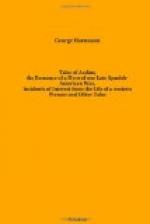But ere long a dire calamity came over the land, for at the command of the revengeful Neptune his mermaids spewed sea-foam into the river’s fresh water addling it with their fish-tails into a nasty brine.
Luckily the good dwarf who in his youth had served his term of apprenticeship at the court of King Gambrinus and was therefore master of the noble craft of brewing kindly taught my forefathers to brew a foaming draught from the malt of barleycorn, which thereafter they drank instead of water.
And now all seafaring men who navigate the river Elbe between Cuxhaven and Hamburg are still troubled with a tremendous thirst which nothing but foaming lager beer may quench.
The founding of the village’s church dates from the conversion of Saxon tribes who inhabited that country. The chapel’s original walls were built of rock, but its newer part was constructed of brick-work during the fourteenth century.
Our domicile, the parsonage, although not quite as ancient, was a very picturesque ruin with its moss-covered roof of thatched straw, under which a flock of sparrows made their homes; but a modern building, how prosaic-looking it might be, or deficient in uniqueness and the charm of its surroundings, would undeniably have made a better, more sanitary and comfortable residence.
Mother, at least, thought this when father landed her, his blushing bride at the ancient parsonage in a rain storm which compelled them to retire for the night under the shelter of an umbrella; and thus the honeymoon of their married life waxed with uncommon hardship.
Later the old leaky house received a tile roof, part of it was removed and with it the room where first I saw the light of day.
That was a cold day for father indeed, as there was another mouth to be fed then, a very serious problem for a poor parson to solve.
When my aunt remarked that I looked like a “monk” father eyed me thoughtfully, saying: “Perhaps there is something to Darwin’s theory after all,” but mother took me to her arms, withering her sister with scornful glances of her flashing eyes. “Certainly does he look like a monk, the poor little tiddledee-diddy darling,” she said; “what else would you expect of him, being the son of a preacher and a descendant of priests?”
On a certain fateful summer day when assembled at dinner we heard the rumble of wheels as an imperial post-chaise hove into view, lumbering lazily past the parsonage.
The postillion’s horn sounded a letter-call and my sisters rushed out, racing over our lawn to the gate, in order to take the message. They returned with a large envelope bearing great official seals, both girls struggling for its possession and fighting like cats for the privilege of carrying the precious document. Mother’s face was wreathed in smiles of ecstacy.
“Your salary, papa,” she whispered, but father was very solemn. “No, dear, it is not due,” he answered. He took the missive from my sister’s hands and turned it over and over, guessing at its contents until mother who was favored with more of that quality which is commonly called “presence of mind” urged him to open it, and see.




